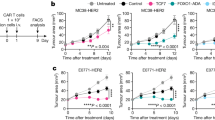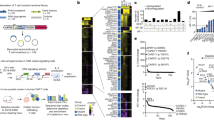Abstract
The NFKBIE gene, which encodes the NF-κB inhibitor IκBε, is mutated in 3–7% of patients with chronic lymphocytic leukemia (CLL). The most recurrent alteration is a 4-bp frameshift deletion associated with NF-κB activation in leukemic B cells and poor clinical outcome. To study the functional consequences of NFKBIE gene inactivation, both in vitro and in vivo, we engineered CLL B cells and CLL-prone mice to stably down-regulate NFKBIE expression and investigated its role in controlling NF-κB activity and disease expansion. We found that IκBε loss leads to NF-κB pathway activation and promotes both migration and proliferation of CLL cells in a dose-dependent manner. Importantly, NFKBIE inactivation was sufficient to induce a more rapid expansion of the CLL clone in lymphoid organs and contributed to the development of an aggressive disease with a shortened survival in both xenografts and genetically modified mice. IκBε deficiency was associated with an alteration of the MAPK pathway, also confirmed by RNA-sequencing in NFKBIE-mutated patient samples, and resistance to the BTK inhibitor ibrutinib. In summary, our work underscores the multimodal relevance of the NF-κB pathway in CLL and paves the way to translate these findings into novel therapeutic options.
This is a preview of subscription content, access via your institution
Access options
Subscribe to this journal
Receive 12 print issues and online access
$259.00 per year
only $21.58 per issue
Buy this article
- Purchase on Springer Link
- Instant access to full article PDF
Prices may be subject to local taxes which are calculated during checkout






Similar content being viewed by others
Data availability
RNA-seq data may be found at the European Genome-Phenome Archive (EGA), https://ega-archive.org/ under accession number EGAS00001006771. For more details, contact corresponding authors.
References
Sutton LA, Rosenquist R. The complex interplay between cell-intrinsic and cell-extrinsic factors driving the evolution of chronic lymphocytic leukemia. Semin Cancer Biol. 2015;34:22–35.
Mansouri L, Papakonstantinou N, Ntoufa S, Stamatopoulos K, Rosenquist R. NF-κB activation in chronic lymphocytic leukemia: A point of convergence of external triggers and intrinsic lesions. Semin Cancer Biol. 2016;39:40–8.
Delgado J, Nadeu F, Colomer D, Campo E. Chronic lymphocytic leukemia: from molecular pathogenesis to novel therapeutic strategies. Haematologica. 2020;105:2205–17.
Mansouri L, Sutton LA, Ljungström V, Bondza S, Arngården L, Bhoi S, et al. Functional loss of IκBε leads to NF-κB deregulation in aggressive chronic lymphocytic leukemia. J Exp Med. 2015;212:833–43.
Damm F, Mylonas E, Cosson A, Yoshida K, Della Valle V, Mouly E, et al. Acquired initiating mutations in early hematopoietic cells of CLL patients. Cancer Discov. 2014;4:1088–101.
Robbe P, Ridout KE, Vavoulis DV, Dréau H, Kinnersley B, Denny N, et al. Whole-genome sequencing of chronic lymphocytic leukemia identifies subgroups with distinct biological and clinical features. Nat Genet. 2022;54:1675–89.
Della-Valle V, Roos-Weil D, Scourzic L, Mouly E, Aid Z, Darwiche W, et al. Nfkbie-deficiency leads to increased susceptibility to develop B-cell lymphoproliferative disorders in aged mice. Blood Cancer J. 2020;10:38.
Mansouri, Thorvaldsdottir L, Sutton LA B, Karakatsoulis G, Meggendorfer M, Parker H, et al. Different prognostic impact of recurrent gene mutations in chronic lymphocytic leukemia depending on IGHV gene somatic hypermutation status: a study by ERIC in HARMONY. Leukemia. 2023;37:339–47.
Alves BN, Tsui R, Almaden J, Shokhirev MN, Davis-Turak J, Fujimoto J, et al. IκBε is a key regulator of B cell expansion by providing negative feedback on cRel and RelA in a stimulus-specific manner. J Immunol. 2014;192:3121–32.
Barbaglio F, Belloni D, Scarfò L, Sbrana FV, Ponzoni M, Bongiovanni L, et al. Three-dimensional co-culture model of chronic lymphocytic leukemia bone marrow microenvironment predicts patient-specific response to mobilizing agents. Haematologica. 2021;106:2334–44.
Belloni D, Ferrarini M, Ferrero E, Guzzeloni V, Barbaglio F, Ghia P, et al. Protocol for generation of 3D bone marrow surrogate microenvironments in a rotary cell culture system. STAR Protoc. 2022;3:101601.
Bertilaccio MTS, Scielzo C, Simonetti G, Ponzoni M, Apollonio B, Fazi C, et al. A novel Rag2−/−γc−/−xenograft model of human CLL. Blood. 2010;115:1605–9.
Ly G, Knorre A, Schmidt TJ, Pahl HL, Merfort I. The anti-inflammatory sesquiterpene lactone helenalin inhibits the transcription factor NF-κB by directly targeting p65. J Biol Chem. 1998;273:33508–16.
Umezawa K, Breborowicz A, Gantsev S. Anticancer Activity of Novel NF-kappa B Inhibitor DHMEQ by Intraperitoneal Administration. Oncol Res. 2020;28:541–50.
Bonfiglio S, Sutton LA, Ljungström V, Capasso A, Pandzic T, Weström S, et al. BTK and PLCG2 remain unmutated in one-third of patients with CLL relapsing on ibrutinib. Blood Adv. 2023;7:2794–806.
Primo D, Scarfò L, Xochelli A, Mattsson M, Ranghetti P, Espinosa AB, et al. A novel ex vivo high-throughput assay reveals antiproliferative effects of idelalisib and ibrutinib in chronic lymphocytic leukemia. Oncotarget. 2018;9:26019–31.
Morande PE, Sivina M, Uriepero A, Seija N, Berca C, Fresia P, et al. Ibrutinib therapy downregulates AID enzyme and proliferative fractions in chronic lymphocytic leukemia. Blood. 2019;133:2056–68.
Bichi R, Shinton SA, Martin ES, Koval A, Calin GA, Cesari R, et al. Human chronic lymphocytic leukemia modeled in mouse by targeted TCL1 expression. Proc Natl Acad Sci USA. 2002;99:6955–60.
Johnson AJ, Lucas DM, Muthusamy N, Smith LL, Edwards RB, De Lay MD, et al. Characterization of the TCL-1 transgenic mouse as a preclinical drug development tool for human chronic lymphocytic leukemia. Blood. 2006;108:1334–8.
Gounari M, Ntoufa S, Gerousi M, Vilia MG, Moysiadis T, Kotta K, et al. Dichotomous Toll-like receptor responses in chronic lymphocytic leukemia patients under ibrutinib treatment. Leukemia. 2019;33:1030–51.
di Bergamo LT, Forestieri G, Loh JW, Singh A, Spina V, Zucchetto A, et al. Adaptation of chronic lymphocytic leukemia to ibrutinib is mediated by epigenetic plasticity of residual disease and bypass signaling via the MAPK pathway. Clin Lymphoma Myeloma Leuk. 2021;21:S323–4.
Woyach JA, Smucker K, Smith LL, Lozanski A, Zhong Y, Ruppert AS, et al. Prolonged lymphocytosis during ibrutinib therapy is associated with distinct molecular characteristics and does not indicate a suboptimal response to therapy. Blood. 2014;123:1810–7.
Liu T, Zhang L, Joo D, Sun SC. NF-κB signaling in inflammation. Signal Transduct Target Ther. 2017;2:17023.
Herishanu Y, Pérez-Galán P, Liu D, Biancotto A, Pittaluga S, Vire B, et al. The lymph node microenvironment promotes B-cell receptor signaling, NF-kappaB activation, and tumor proliferation in chronic lymphocytic leukemia. Blood. 2011;117:563–74.
Doménech E, Gómez-López G, Gzlez-Peña D, López M, Herreros B, Menezes J, et al. New mutations in chronic lymphocytic leukemia identified by target enrichment and deep sequencing. PloS One. 2012;7:e38158.
Rose-Zerilli MJJ, Gibson J, Wang J, Tapper W, Davis Z, Parker H, et al. Longitudinal copy number, whole exome and targeted deep sequencing of “good risk” IGHV-mutated CLL patients with progressive disease. Leukemia. 2016;30:1301–10.
Ecker V, Brandmeier L, Stumpf M, Giansanti P, Moreira AV, Pfeuffer L, et al. Negative feedback regulation of MAPK signaling is an important driver of chronic lymphocytic leukemia progression. Cell Rep. 2023;42:113017.
Acknowledgements
The research leading to these results has received funding from AIRC under IG 2017 - ID. 20246 – P.I. Ghia Paolo, IG 2022- ID. 27566, P.I. Ghia Paolo and under 5 per Mille 2018 - ID. 21198 program – P.I. Foà Roberto, G.L. Ghia Paolo. This research was also supported by the MH CR projects AZV No. NU20-08-00314 and FNBr 65269705 and National Institute for Cancer Research (Programme EXCELES, ID Project No. LX22NPO5102) - Next Generation EU to SP.
Author information
Authors and Affiliations
Contributions
JB, CL, MF, AP, AC, PG designed the study. JB, CL, MF, AMo, DB, AMa and AP performed the experiments. GT prepared and provided the in vitro models. GG, SK, NP, FEP and FG performed the bioinformatic analysis. FD, NEK, AWL, SP and LS provided patient specimens. EP and PR performed sample purification and DNA/RNA extraction. FG, DH and LM performed NGS experiments. PG supervised most experiments and the overall implementation of the study and acquired funding. JB, CL, MF, AP, AC and PG interpreted data and wrote the manuscript. PG, RR and KS revised the manuscript. All authors analyzed data, reviewed and approved the final version of the manuscript.
Corresponding authors
Ethics declarations
Competing interests
PG: honoraria/advisory board: AbbVie, Acerta/AstraZeneca, Adaptive, ArQule/MSD, BeiGene, CelGene/Juno, Gilead, Janssen, Loxo/Lilly, Sunesis; research funding: AbbVie, Gilead, Janssen, Novartis, Sunesis. RR: honoraria/advisory board: Abbvie, AstraZeneca, Janssen, Illumina and Roche. KS: honoraria/advisory board: AbbVie, Acerta/AstraZeneca, Gilead, Janssen; research funding: AbbVie, Gilead, Janssen.; NEK: Advisory Board for: AbbVie, Astra Zeneca, Beigene, Behring, Boehringer Ingelheim Pharmaceuticals, Inc., Dava Oncology, Janssen, Juno Therapeutics, Pharmacyclics. DSMC (Data Safety Monitoring Committee) for: Agios Pharm, AstraZeneca, BMS –Celgene, Dren Bio Janssen,. Research funding from: AbbVie, Acerta Pharma, Bristol Meyer Squib, Celgene, Genentech, Pharmacyclics, Sunesis, Vincerx.; LS: advisory board: AbbVie, AstraZeneca, Janssen.
Additional information
Publisher’s note Springer Nature remains neutral with regard to jurisdictional claims in published maps and institutional affiliations.
Supplementary information
Rights and permissions
Springer Nature or its licensor (e.g. a society or other partner) holds exclusive rights to this article under a publishing agreement with the author(s) or other rightsholder(s); author self-archiving of the accepted manuscript version of this article is solely governed by the terms of such publishing agreement and applicable law.
About this article
Cite this article
Bordini, J., Lenzi, C., Frenquelli, M. et al. IκBε deficiency accelerates disease development in chronic lymphocytic leukemia. Leukemia (2024). https://doi.org/10.1038/s41375-024-02236-4
Received:
Revised:
Accepted:
Published:
DOI: https://doi.org/10.1038/s41375-024-02236-4



